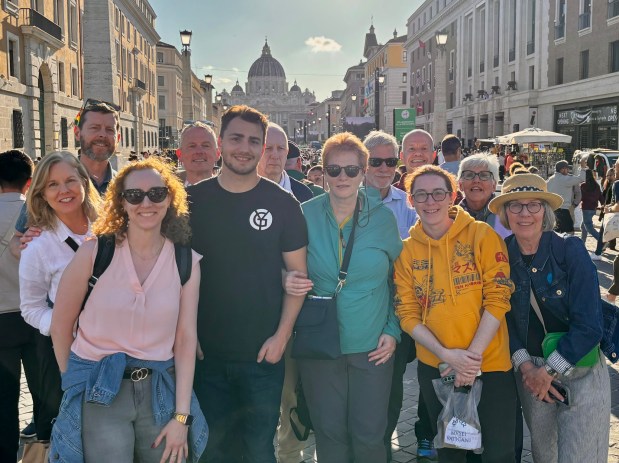Robert Francis Prevost, the Chicago-born cardinal selected Thursday as the next pope, is partially descended from Creole people of color, according to Jari C. Honora, a noted genealogist and historian.
Honora works at the Historic New Orleans Collection, a museum in the French Quarter, and was a researcher on the TV show “Finding Your Roots” with historian Henry Louis Gates Jr.
Honora said in an interview that he found evidence that the new pope’s maternal grandparents were Joseph Martinez and Louise Baquié, of New Orleans. In a Facebook post, he displayed records of a marriage certificate with those two names.
He said he had also reviewed a photo of Martinez’s grave marker in Chicago, where their daughter — Mildred Martinez, the pope’s mother — was born.
Robert Prevost was ‘the pride and joy of every priest and nun’ at St. Mary’s on Chicago’s South Side
It’s unclear whether the new pope, who took the name Leo XIV, has ever addressed his ancestry in public, interviews or his writings.
The records show that couple married at Our Lady of the Sacred Heart in New Orleans. Until it was destroyed by a hurricane in 1915, the church’s building was on Annette Street in the city’s 7th Ward, a historic center of Louisiana’s Afro-Creole culture.
The word “Creole” has multiple meanings in a Louisiana context. It can refer to people of European descent who were born in the Americas. But it also commonly refers to mixed-race people of color.
Many of these Louisianans were known in the 18th and 19th centuries as “gens de couleur libres,” or free people of color. Many were well educated, French-speaking and Roman Catholic.
Over the decades, they established a foothold in business, the building trades and the arts, particularly music, with significant contributions to the development of jazz. They continue to be an important strand in the city’s famously heterogeneous culture.
Lolita Villavasso Cherrie, a co-founder with Honora of The Creole Genealogical and Historical Association, said that the research appeared to signal a tremendous moment for the history of Louisiana Creoles, if a branch of the pope’s family tree indeed stretched back to New Orleans.
“It would be so fabulous to have someone who has some connection to our people, who give us the recognition we deserve,” said Villavasso Cherrie, 79, a retired teacher. “I hate to say it, but we feel, many of us, that our history was hidden from us.”
That is in part, she said, because many Creoles have been able to “pass” as white over the years. It was only with the advent of the internet, she said, that many people began to research their family history and became aware of their Creole roots.
Villavasso Cherrie noted that in the 20th century, a significant number of Louisiana Creoles migrated to the Chicago area and California.
Pope Leo XIV’s family: What to know about his parents and their deep Chicago ties
Honora said he began looking into Leo XIV’s family history because the name “Prevost” sounded French; he thought it might be of Canadian origin and possibly connected to the Acadians, French-speaking people who relocated to Louisiana in the 19th century.
He said he has not fully researched the origin of that name. Instead, he said, he found the maternal connection to New Orleans when reviewing his records. He had “no doubt,” he said, that his research was accurate.
Honora, who is African American, Catholic and a New Orleans native, chuckled when asked how he felt while making what might be the most important discovery of his career.
This article originally appeared in The New York Times.




